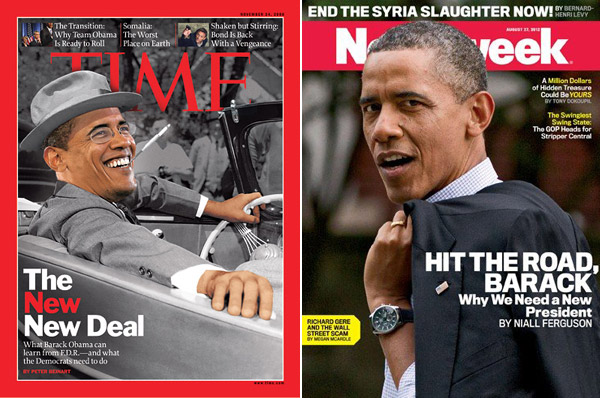
One handy use for national newsweeklies, especially as they cast about for readers, is that they do capture a conveniently exaggerated synopsis of the conventional wisdom and lock it into a memorable cover. At the beginning of Barack Obama's first term, it was an assumption that the administration would follow Rahm Emanuel's advice about never letting a crisis go to waste, and roll out an economic rescue not seen since FDR. Four years later, even unexpectedly modest reforms were cut down in Congress's partisan grain thresher, as Michael Grunwald details in his new book:
I spoke to seven different Republican senators who said, ‘Joe, I’m not going to be able to help you on anything,’” Biden is quoted as saying. “The way it was characterized to me was: ‘For the next two years, we can’t let you succeed in anything. That’s our ticket to coming back.’”
But Grunwald's research also suggests that the GOP had polling backing up the idea that a platform of resistence would be popular, or at least sufficiently popular to hold their ground, which was not what a lot of people, particularly the current mayor of Chicago, had expected:
Mr. Emanuel noted, correctly, that the U.S. largely squandered the opportunity the oil shocks of the 1970s presented to make serious, long-term changes in its energy habits — a failure that has returned to haunt the nation today.
Conversely, history points to examples of leaders who have used crises to seize opportunities. Most obviously, President Franklin Roosevelt took advantage of economic trauma in the 1930s to drive through a new economic agenda, as did President Ronald Reagan with his tax cuts in 1981.
Instead, we got what Norman Ornstein calls the Worst. Congress. Ever. and the hyperpartisan gridlock that followed. Perhaps the conventional wisdom was wrong about crisis—about how, historically, they ususally do go to waste, specifically because the electorate polarizes in response to financial crisis. That's the contention of a new working paper co-authored by the U. of C.'s Amir Sufi, author of some compelling recent work about the financial crisis and its aftermath:
Using the Reinhart and Rogoff (2009, 2011) comprehensive data set on financial crises, we show that banking, currency, inflation, or debt crises lead to greater ideological polarization in society, greater fractionalization of the legislative body, and a decrease in the size of the working majority of the ruling coalition. The size of the governing coalition shrinks after almost any type of crisis (banking, currency, or inflation crises) and, at the same time, political fragmentation increases.
In other words, while people might want big solutions in the wake of crisis, the actual response makes those solutions much harder to implement; in this sense, the GOP, particularly the House GOP, was going with prevailing attitudes in such an event. The result is more reforms, because people want something done, but minor ones, because major ones are hard, if not impossible, in a more polarized political environment. In the U.S., they found that this polarization, in particular, manifested itself in Congress after banking and market crises. Notably, they find different results for events like 9/11: "Focusing on the point estimates alone and with the caveat of the wide confidence intervals, governments appear stronger and relatively more cohesive after a terrorist attack. A country appears to come together politically after such events."
What's the difference? A terrorist attack typically pits the country against outsiders, whether foreigners or (in the case of the Oklahoma City bombing, for example) outsiders in their own land. A financial crisis, on the other hand, typically increases economic inequality, pitting creditors against debtors, haves against have-nots, the bailed-out against the bailers:
One can notice the disparity of how the value of real estate assets, mostly held by middle- and low-income indebted households, is still far from having recovered to pre-crisis levels, while
financial assets, mostly held by the wealthy, have already bounced back.
In addition, debtors become insolvent precisely at the time creditors are more in need of seeing their outstanding credit is serviced. The same write-off that can be inconsequential to a
creditor during an expansion may prove lethal in bad times. This drives further apart the positions of these two specific constituencies in society. Some may be hit harder than others in a financial crisis, and this is a consequential economic and political phenomenon.
The haves also tend to be more successful in the aftermath because money brings organization and access, further increasing polarization. The authors cite Gallup polls, which found that in May 2007 40 percent of respondents self-identified as economic conservatives and 18 percent as economic liberals, and five years later those numbers had risen to 46 percent and 20 percent. Similar patters have been observed across the world. (Update: the Pew Center's latest American Values study has many, many more indications of a partisan divide that correlates with the financial crisis.)
The authors don't go very far into solutions, but do suggest actually indexing contracts to the state of the economy, a more sophisticated version of the taxi-gas surcharge we have in Chicago for when the price of gas goes over a certain level:
For example, in mortgage contracts the contingency could be the level of aggregate (or regional) price index. If the state of the economy, or the housing index in this example, performs too poorly then the contingency could automatically kick in and restructure the debt.
Currently the FHFA has been gently tiptoeing around debt restructuring, which its own analysis suggests would be a net benefit. An automatic trigger would avoid the political warfare associated with such a move, but such a response is unlikely while the conventional wisdom suggests that crises are the best time to act.


